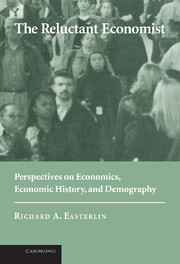Book contents
- Frontmatter
- Contents
- List of Tables and Figures
- Preface
- Acknowledgments
- PART ONE ECONOMICS
- PART TWO ECONOMIC HISTORY
- PART THREE DEMOGRAPHY
- 8 An Economic Framework for Fertility Analysis
- 9 New Perspectives on the Demographic Transition
- 10 Does Human Fertility Adjust to the Environment? Population Change and Farm Settlement in the Northern United States
- 11 America's Baby Boom and Bust, 1940–1980: Causes and Consequences
- 12 Preferences and Prices in Choice of Career: The Switch to Business
- Epilogue
- Bibliography
- Index
8 - An Economic Framework for Fertility Analysis
Published online by Cambridge University Press: 03 December 2009
- Frontmatter
- Contents
- List of Tables and Figures
- Preface
- Acknowledgments
- PART ONE ECONOMICS
- PART TWO ECONOMIC HISTORY
- PART THREE DEMOGRAPHY
- 8 An Economic Framework for Fertility Analysis
- 9 New Perspectives on the Demographic Transition
- 10 Does Human Fertility Adjust to the Environment? Population Change and Farm Settlement in the Northern United States
- 11 America's Baby Boom and Bust, 1940–1980: Causes and Consequences
- 12 Preferences and Prices in Choice of Career: The Switch to Business
- Epilogue
- Bibliography
- Index
Summary
How relevant to human fertility behavior is economic theory? The answer is, I believe, not as much as it could be. In this chapter I try to extend the mainstream, demand-oriented economic theory of fertility to improve its applicability to a wider range of childbearing behavior in time and space.
In the first two decades after World War II, most theoretical work on the economics of fertility derived from seminal studies by Harvey Leibenstein (1957) and Gary S. Becker (1960) in which the economic theory of consumer behavior was applied, in one form or another, to childbearing decisions (see also Easterlin 1969; Robinson and Horlacher 1971). The conventional theory of consumer behavior views the individual as trying to maximize satisfaction given a range of goods, their prices, and his or her own tastes and income. In the application of the theory to fertility analysis, children are viewed as a special kind of consumer durable good, and fertility is seen as a response to the consumer's demand for children relative to other goods. In the mid-1960s, a special variant of this approach emerged, deriving chiefly from an article by Becker (1965) and distinguished by use of the concept of a “household production function” (T. W. Schultz 1973, 1974). In this chapter, the term economic theory of fertility refers to both the older and newer variants.
- Type
- Chapter
- Information
- The Reluctant EconomistPerspectives on Economics, Economic History, and Demography, pp. 141 - 165Publisher: Cambridge University PressPrint publication year: 2004



